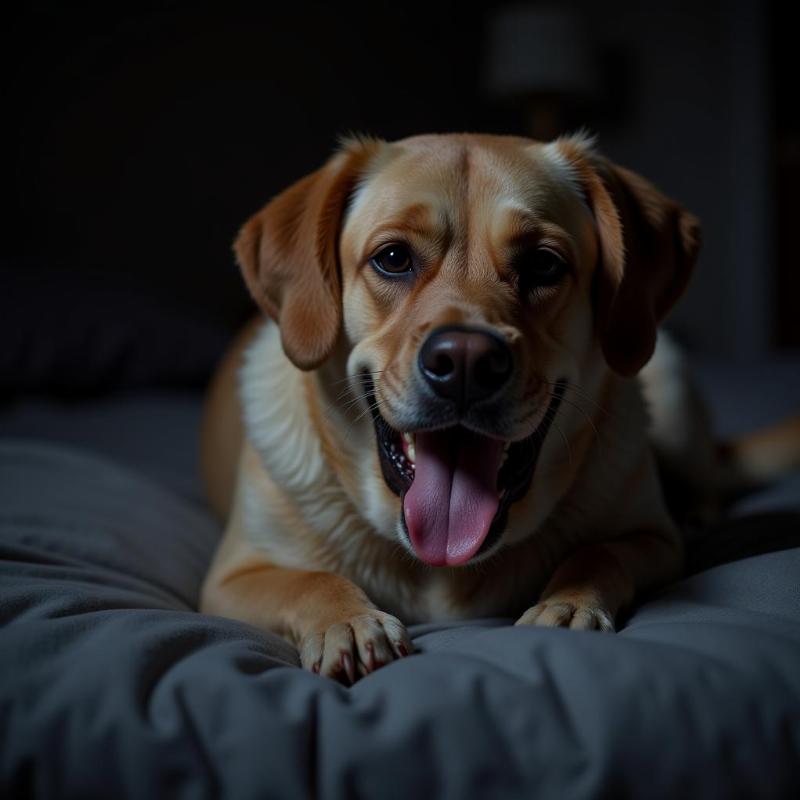If your dog is restless at night and panting, it can be concerning. This behavior can stem from various reasons, ranging from simple discomfort to more serious underlying health issues. Understanding the potential causes is crucial to ensuring your furry friend’s well-being. This article will explore the common reasons for nighttime restlessness and panting in dogs, offer practical solutions, and guide you on when to seek professional veterinary care.
Decoding Your Dog’s Nighttime Restlessness and Panting
Several factors can contribute to your dog’s restlessness and panting at night. Is the room too hot? A comfortable temperature is key for a good night’s sleep, for both you and your canine companion. Pain or discomfort can also manifest as restlessness and panting. Think arthritis, injuries, or even a full bladder. Anxiety and stress are other culprits. Loud noises, changes in routine, or separation anxiety can disrupt your dog’s sleep.
 Dog Restless and Panting at Night
Dog Restless and Panting at Night
Medical Conditions That Can Cause Restlessness and Panting
While environmental factors are often the cause, underlying medical conditions can also lead to nighttime restlessness and panting. Cushing’s disease, heart problems, and respiratory issues can all contribute to these symptoms. Cognitive dysfunction syndrome, similar to dementia in humans, can also disrupt sleep patterns. If your dog’s restlessness and panting persist, consulting a veterinarian is essential for proper diagnosis and treatment.
Creating a Calm and Comfortable Sleeping Environment
A conducive sleep environment can significantly improve your dog’s nighttime comfort. Ensure the room is well-ventilated and at a comfortable temperature. A cozy dog bed, perhaps an orthopedic one for senior dogs, can alleviate joint pain. dog whining while lying down can also indicate discomfort, which a good bed can help with. A consistent bedtime routine and a calming presence can also ease anxiety and promote relaxation. Consider a white noise machine to mask disruptive sounds.
When to Seek Veterinary Care
If your dog’s restlessness and panting are accompanied by other symptoms like vomiting, diarrhea, loss of appetite, or changes in breathing, seek immediate veterinary attention. dog panting in middle of night can sometimes indicate a more serious issue. Similarly, if the restlessness and panting are sudden, severe, or persist despite addressing environmental factors, a veterinary checkup is crucial.
Is it Normal for My Dog to Pant at Night?
Sometimes, a little panting at night is normal, especially if your dog is a brachycephalic breed (like a Pug or French Bulldog) or if the room is warm. However, excessive or persistent panting coupled with restlessness warrants further investigation. why is my dog panting so hard at night This is a question many owners ask, and the answer often lies in a combination of factors.
How Can I Help My Dog Sleep Better?
Establishing a regular sleep schedule, providing a comfortable sleeping area, and ensuring adequate exercise during the day can significantly improve your dog’s sleep quality. Consider a dog winter coat with hood if your home gets chilly at night, especially during the winter months. For dogs experiencing anxiety, calming aids like pheromone diffusers or anxiety vests can be helpful. heavy dog panting at night can be a sign of discomfort, and addressing this is key for better sleep.
Conclusion
A dog restless at night and panting can be a sign of various issues, from simple discomfort to more complex medical conditions. By understanding the potential causes and implementing practical solutions, you can help your furry friend get a good night’s rest. Remember, if you’re concerned, consulting with a veterinarian is always the best course of action.
FAQ
- Why is my dog restless and panting at night? Several factors can contribute, including discomfort, anxiety, temperature, and underlying medical conditions.
- When should I be concerned about my dog’s panting and restlessness? If it’s excessive, accompanied by other symptoms, or persists despite addressing environmental factors, consult a vet.
- How can I create a comfortable sleeping environment for my dog? Ensure a suitable temperature, a comfortable bed, a consistent routine, and a quiet environment.
- Can anxiety cause nighttime restlessness in dogs? Yes, anxiety and stress are common culprits.
- What medical conditions can cause panting and restlessness? Cushing’s disease, heart problems, respiratory issues, and cognitive dysfunction syndrome are possibilities.
- Is some panting at night normal for dogs? A little panting can be normal, especially in certain breeds or if the room is warm, but excessive panting should be investigated.
- How can I help my anxious dog sleep better at night? Consider calming aids like pheromone diffusers or anxiety vests, along with a consistent bedtime routine.
Beautdogs.us is your premier online destination for all things dog-related in the US. We offer expert advice on dog breeds, grooming, training, health, and lifestyle. From understanding the nuances of specific breeds to navigating the latest pet care trends, Beautdogs.us is a trusted resource for both novice and experienced dog owners. We’re committed to providing comprehensive, engaging, and reliable information to help you and your furry friend live a happy and healthy life. Contact us at [email protected] or +1 501-555-7529 for any questions.